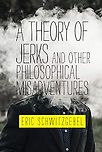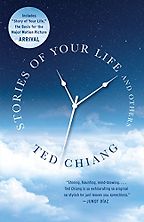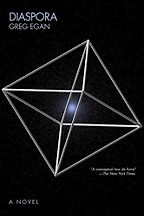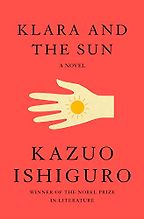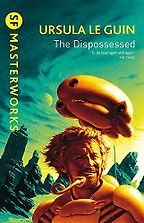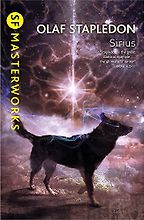Before we get into the five books you have chosen, might you tell us: what’s your special interest in science fiction, and how does it tie in with philosophy?
Well, partly, I just love it. There’s something to be said for pursuing what you love. But I also think science fiction is a great fit for philosophy in a couple of ways. Speculative fiction, generally, I think of as fiction that explores scenarios beyond the ordinary run of human experience. Other types of fiction—for example, ‘literary fiction,’ as it’s sometimes called—don’t much depart from the ordinary run of human experience. But in philosophy we’re often fascinated with scenarios that pull apart things that ordinarily go together.
A wonderful example of this is Derek Parfit’s work on personal identity. Ordinarily, a person has one body that continues in a specific way over time, permanently connected to one mind that also continues in a specific way over time. There’s a familiar body and a consistent personality. You have memories that move from one moment to the next and experiences that overlap. All of these things go together, and we think of them as constitutive or partly constitutive or somehow involved with or correlated with being a person. In the ordinary run of human experience, these things never come apart. But in science fiction-type thought experiments you can wonder, okay, what would happen if you took someone’s mind, just to put it crudely, and put it in someone else’s body? Would it be the same person? Would the person follow the mind or would they follow the body? What if you stepped into a machine and two duplicates of you walked out? What if you lived 800 years, gradually acquiring a new personality every century and entirely forgetting your past? You can separate the pieces, considering what really matters about a person’s identity. You can decouple what ordinarily goes together, aiming to find the essence of the matter in the way that philosophers characteristically like to do.
It’s an interesting conundrum, because some science fiction seems to extrapolate from existing science to a future that’s possible and consistent with what we know about science today. That is, a hypothetical situation that is a plausible, possible future world—or maybe not so plausible, but still could happen. But there’s another kind of science fiction which doesn’t seem to be bound by anything we know about science now—it just allows what you might call magical things to happen. I wonder how the two of them relate to philosophy.
Fantasy just allows magical things to happen. And that can be very useful in thinking through philosophical issues because you might be interested in considering things that aren’t scientifically plausible at all, exploring them as conceptual possibilities. Now, within the constraints of scientific plausibility we can find a second big philosophical value in science fiction: thinking about the future. For example, I think it’s likely that in the next several decades, or maybe the next 100 or 200 years, if humanity continues to exist and continues along its current trajectory, we will eventually create artificial beings who are conscious. Maybe they’ll be robots or maybe they’ll artificial biological organisms. Or they might be a bio-machine hybrid or the result of technology we can’t yet foresee. We might create artificial entities who are people—entities with conscious experiences, self-knowledge, values, who think of themselves as individuals. They might be very much unlike us in other ways—physiologically, physically, maybe in their values, maybe in their styles of thinking.
Get the weekly Five Books newsletter
If that happens, that’s hugely significant. We’d have created a new species of person—people radically different from us, sharing the world with us. Humanity’s children, so to speak. Few things could be more historically momentous than that! But these matters are hard to think about well. Maybe that future is coming. But what might it even look like? What would it do to ethics? To philosophy of mind? To our sense of the purpose and value of humanity itself? Science fiction is a tool for imagining the possible shape of such a future. So that’s just one example of the way in which science fiction can help us think about future possibilities.
What I like about science fiction is there are many different voices, many different styles of experiment, as it were, with a lot of detail. It’s not just a caricature. You have a whole range of imagined worlds and imagined futures to draw on. It’s not as if there’s just one simple trolley problem that you have play variations on. They’re radically different, densely described scenarios. I think that’s a richness that it’d be hard to generate in a one-liner thought experiment.
I want to distinguish two epistemic dimensions here. One is richness of detail. The other is emotional or imaginative engagement. In my conception, you can think philosophically anywhere along a spectrum. On side are extremely abstract, cool-minded general statements like ‘maximise the sum of positive to negative emotional experiences’, or ‘the greatest good for the greatest number’. On the other side are richly imagined fictional worlds, worlds that really draw you in and shake you up, like a great novel or television series. In between are short stories and paragraph-long thought experiments like the famous trolley problem.
There are different, complementary epistemic virtues to the different sides of the spectrum. The abstract strips away irrelevancies, or what you think are irrelevancies. But the human mind is not so good at understanding the implications of abstract views. Even really simple things like the Wason Selection Task defeat us pretty badly. The amazing thing about the Wason Selection Task is that it’s a super simple cognitive puzzle. Really simple! And yet we are incredibly bad at it.
“Science fiction is a tool for imagining the possible shape of the future”
I used to write questions for law school admissions tests, the informal paragraph-long logical reasoning questions. I had a formula for a tricky question. I would write a paragraph in ordinary language on something that people have no intuitions about, like maybe the rise or fall of interest rates and its bearing on Party A and Party B in Bolivian politics. I’d write a paragraph about it. At the end, I’d present five possible answers combining negation and a conditional statement in ordinary language. Option A might be ‘Unless interest rates go down, Party B will not win.’ Option B might be ‘Party A will only lose if interest rates go up.’ Already your brain starts frying, just thinking about these. I can’t immediately tell the options apart, and I just wrote them! A computer could do that with just a few bits of information. It’s just a negation and a conditional.
That’s a long digression. But the human mind is really bad at abstract reasoning. What we’re good at is social cognition. And imagination. So when you have rich stories, and you engage social cognition and imagination, you meet the human mind where it’s strong. We can consider what would a principle like ‘maximize good consequences’ really amount to? It sounds good in the abstract, but does that mean you’re going to push someone in front of a runaway trolley, killing them to save five others? Well, I’m not sure. Once we start to think of it in that way, we’re engaging a different side of our mind. But the complementary problem is that you can get distracted by details irrelevant to your general thesis. Whether you want to push the guy shouldn’t depend on his race, for example. How much you sympathize with a character in a fiction might depend on whether they’re funny, whether they had a happy or sad childhood. You get influenced by all these details you might not want to be influenced by, and it’s not always clear which ones are relevant.
It’s a question of determining what’s noise and what isn’t. And noise might be necessary to make it plausible in some ways. Realism in writing often requires all kinds of extraneous facts. If you only put in things which play a role in the plot, you give the plot away before you mean to.
As a writer, you have these intuitions about which details it makes sense to include and which don’t work. You might not even know why they seem right or wrong.
Yes. When we’re talking about moral psychology, a rich psychological case study is so much more fascinating than a one liner or a caricature of a person. You come to see the complexity of a dilemma for somebody who’s a real person, or seems to be a real person, rather than for person ‘P’ in a schematic account of a situation. But let’s move on to your first book choice, Ted Chiang’s Stories of Your Life and Others.
Ted Chiang is a short story and novella writer who’s not very prolific. He’s published famously few stories. But a large proportion of his stories have a huge impact and win prizes. His stories are so richly philosophical. The book I’ve chosen is his first story collection. He has another collection that came out recently, Exhalation, which is also excellent. But I have an emotional attachment to the first one because that was the one that kindled my love for Ted Chiang’s work.
Though he was certainly well known in the science fiction short story community, his public fame came with Arrival, a blockbuster movie that was based on one of the stories in this collection: ‘Story of Your Life.’ In that story, an alien species arrives at Earth. The story is from the point of view of a linguist who is trying to decipher their language. Their written language is visual and non-temporal in a fascinating way, and one of the wonderful things about the story is how Chiang thinks it through in fascinating detail, what the grammar of a non-temporal, visual language might be, how it might influence cognition, how to build up a language spatially organised in a two dimensional plane rather than linearly and temporally organised, like human languages.
Are there other notable stories in this collection? Could you talk us through one?
‘Liking What You See’ is a fascinating philosophical thought experiment story set in a near future where people can wear helmets that contain a trans-cranial magnetic stimulator that shuts down the region of their brain that is responsible for making human beauty judgments. It’s told as a documentary with lots of voices expressing different perspectives. But the most central point of view in the story is that of a woman who’s just arrived at college after having been raised in a small community of people who are committed to wearing these helmets. She’s been raised from youth never to make human beauty judgments. She arrives at college and has to decide whether to stop wearing the helmet and end her calliagnosia, the inability to judge human beauty. At the same time, the school is debating whether to require students all to wear calliagnosia devices. The idea is that human beauty judgments are just too loaded with bias and create so much inequality in society. There’s a big psychological literature on this. There are strong correlations between conventional ratings of someone’s beauty and how well they’re treated by other people, even in academic contexts, where your physical beauty shouldn’t matter.
John Donne, the Elizabethan poet, had this line about how Christ wouldn’t condemn him on the Day of Judgement because ‘this beauteous form assures a pitious mind’. Donne seemed to believe that beauty assured pity.
We react so differently to people we find physically beautiful than to people we find physically unattractive. There’s something to be said for just taking that out of our lives. Why should we let physical beauty affect our judgments so much?
That sounds brilliant—a highly imaginative way of addressing that issue of equality of appearance. Do you think it’s actually doing philosophy? Or is it material to philosophise about?
I think it’s doing philosophy.
It’s one of Chiang’s most philosophically explicit stories. It’s structured as a documentary, where you hear one character’s voice after another, and each of the characters explains their view about calliagnosia. You hear a humanities professor who says it would be such a loss to humanity to turn off our capacity for appreciating beauty, that we need to be able to appreciate beauty but also to set it aside in making judgments about people. Then it splices to a student who says, ‘Realistically, people never do that. Come on, give me a break.’ Chiang works through the issues philosophically explicitly. I think it is doing philosophy.
Interesting. I’m sold. If the other stories are anything like that, it must be superb. Let’s move to the second book on your list of science fiction books with philosophical aspects, Greg Egan’s Diaspora.
This book imagines a far future in which the world is populated with a diverse range of what I will call ‘persons’, rather than ‘humans’. So if we think of a human as a biological member of Homo sapiens—there are other ways of thinking about them—but if we think about humans that way, we can think about a person as someone who’s ethically relevantly like a human in deserving the highest level of moral concern, but who is possibly an artificial intelligence or a member of another species.
In Diaspora, there are AI systems, there are robots, and there are genetically altered humans who populate Earth. Humanity has managed to create real persons who exist inside simulated environments, in high capacity protected computers, and real persons who exist in robot bodies, who are exploring the solar system, and real persons who are biological. Those biological persons come in various forms, because we’ve taken control of our genome. So there are some who have gills and swim under the sea, and there are some who have engineered out of themselves all capacity for language; there are some biological persons who value very different things than we do, who maybe have really deep insight into biochemistry and smell capacities that allow them to interact with a forest in a radically different way than we do.
Five Books interviews are expensive to produce. If you're enjoying this interview, please support us by donating a small amount.
This is a society without significant scarcity. In this society, people have immense freedom to consider what kind of life they want to live because they don’t need to hold down a job to draw an income. Furthermore, you can control your own values, especially if you’re one of the AI systems. You can just tinker with your settings, saying, ‘Okay, I think I’m going to really love math for a little while’, or you can change your values in many other ways.
At one point in Diaspora, there’s an art installation. The people who want to go to the art installation get a special profile attached to their personality so that they will appreciate art in a certain way. One of the main characters adopts the profile, and suddenly she notices the world differently. The clouds in the sky become salient for her as they never would have before. You can voluntarily adopt a new worldview for a while, then shed it. It gives us the existentialists’ question in its purest form. I take central idea of existentialism to be that you have freedom to figure out what you value and pursue that. That freedom is limited in ordinary embodied human life. But much less so in this story.
I can choose now at 59 that I want to be the best ever concert violinist, but it’s going to be a tough mountain to climb, I can tell you.
Right. You couldn’t really achieve it, and you’re limited by various practical necessities. But the AI systems in Diaspora aren’t nearly as constrained, with massive resources, vast lifespans, and vast abilities to control both their internal structure and their environment.
Are you saying they’ve got the capacity to fulfil their desires in a way that we don’t?
Yes. And a capacity to control and construct desires beyond what we can even imagine. You could desire to become an artist in 16 dimensional space who works with smellscapes.
Bernard Suits has got this playful idea in his book, The Grasshopper that in heaven the only worthwhile thing to do is play games. That’s because any sort of practical thing that you do becomes tedious. But game playing is putting unnecessary obstacles in your way to achieve certain sorts of pleasurable interactions, and ends that are defined by the rules of the game. And that’s the only worthwhile thing left, if you can have everything.
Yes, I see the pull of that. I think you could take Egan’s work as moving a bit in that direction, although I don’t think he goes fully there.
Without giving too much away, does he just paint a picture where there are these possibilities? Or does he reveal a preferred option?
He does not commit, he paints the picture. This is one of the other wonderful things about science fiction. Different characters illustrate different possibilities. One character decides to install an outlook that is universally self-affirming, in the sense that once you adopt it, you can never decide that another outlook would be better. This outlook has an ethics and aesthetics with some resemblance to Buddhism. The character tweaks his settings so that he’s just going to be at peace with the now and he enters into an inescapable meditative state, and his friends are like, ‘Okay, goodbye.’ It probably strikes the reader as disappointing, a mistake. But maybe there’s something to that. Another character plays through all the possibilities that he sees in his personality, and then at the end of an immensely long life, he’s like, ‘I’ve pretty much done everything, so goodbye.’ Another character ends up giving herself over completely to exploring the beauties of mathematics.
It could go on forever, that book. If there really are all those potential ways of fulfilling yourself.
It is breath-taking in that it gives you a sense of the amazing variety of possible ways of living once you lift the constraints that we normally take for granted.
It could be an endorsement of value pluralism, the way you’ve described it. We with all our constraints have to make tragic choices between things. You can’t do everything. You have to make a choice. Values are incommensurable. You can compare some different ways of life, but ultimately, you have some choices you make that you can’t really quantify and come to a decision about which is the better one. And you can’t commit to everything.
That’s part of what’s coming across in this book. One dimension of difference is how much the different characters care about embodiment. There are biological humans who are highly constrained by the physical and biological realities of Earth and who risk dying in accidents. They choose this and see value in biologically constrained forms of life. And then there are robots who are embodied but not constrained in quite the same way, who can back themselves up and orbit around Saturn. And then there are AI people without conventional bodies at all, living in artificial environments, but who chose to experience themselves as having bodies in those environments, subject to virtual laws of physics like friction and gravity, but maybe they don’t need to use the toilet. And then you have AI people who just dispense with all of that—why would you want friction? Just forget that, it’s constraining. Who needs gravity?
This is making me think of solutions to housing problems. You don’t have to have better housing for people, you just have to have better virtual reality.
These computers are buried 200 meters under the ground in Siberia, so they don’t take up a lot of surface space on Earth!
Okay, let’s move to your third choice, Kazuo Ishiguro’s Klara and the Sun.
Sure. This came out last year. It’s fun to have a really recent choice. I love this book. This is told from the point of view of an ‘artificial friend.’ Klara is a robot who’s conscious, sentient—a person—who is designed to be a companion to a wealthy disabled girl. Her whole purpose is to be as good a companion as possible to this girl, Josie. Ishiguro is brilliant in giving you the world through the eyes of Klara.
How do we know Klara’s actually conscious?
You kind of assume it because it’s told from the first person perspective. Klara’s talking about what she’s thinking all the time. It’s a very meditative, reflective book. So it’s hard to conceptualize that as a reader without regarding Klara as a conscious being.
Ishiguro normally doesn’t write science fiction…
He has another interesting science fiction book, Never Let Me Go, but he doesn’t primarily do science fiction. Interestingly Klara and the Sun has some similarities with Ishiguro’s earlier book The Remains of the Day in that it’s told from the point of view of someone whose life is given over to service. And it raises some of the same issues, but maybe in an even starker way than The Remains of the Day does, because Klara doesn’t have many independent desires or values other than to be a servant. So everything she does is for the sake of that.
I don’t think I’ll give anything important away by describing the last scene. She’s at the end of her life, in a junkyard. She’s completely happy. One of the amazing things about this book is that Klara is so delighted and unbored with what you think would be abject servitude. In the junkyard at the end, she’s just completely content. All she’s doing is reflecting on her earlier excellence as a servant to Josie and treasuring her memories and being grateful for her existence.
That’s like a drone in Plato’s Republic. If everything goes to plan you believe the Noble Lie that everyone is born with a correct place in that society and find fulfilment in that role. That’s what you’re for.
So it leaves you with this question of the authenticity of her desires. It’s told so completely and so perfectly from Klara’s point of view that she never even raises the question of whether these are authentic desires, whether she should have some desires for her own flourishing, or for her own sake. But as a thoughtful reader you want to shout at her, ‘You matter as much as Josie! You shouldn’t always just sacrifice everything for her!’ But Klara doesn’t ever think of doing other than the very best for Josie, at whatever cost. It doesn’t even occur to her. But at the same time she experiences her existence as completely fulfilling.
Isn’t that the problem with ideology, that we have the illusion of making significant choices, but from a world-history perspective, we’re in this flow of forces we can’t really compete with or reshape?
Yes, that’s true. Klara and the Sun raises those issues in a fascinating way through this brilliantly told perspective. Also fascinating is Klara’s wonderfully naive religious worship of the sun. She’s a solar-powered robot. She sees a man that she thinks is dead on the sidewalk, and then the sun shines on him and he gets up. She thinks that the Sun performed a miracle cure, and she wants a miracle cure for Josie. She makes sacrifices to the sun in this completely charmingly naive way.
Usually when we think of helpful robots their whole world has been programmed into them. They don’t become who they are so much from learning and extrapolating from experience. That’s really interesting.
Yes. And then from a philosophy of religion standpoint, it’s fascinating to think about Klara’s religiosity and what’s good about it or not so good about it. But to really get into that, I have to give some spoilers.
No, don’t spoil it. But you’re clearly saying it’s a good read.
Yes, it’s a wonderful read. Ishiguro is a superb prose stylist. His sentences are so spare and simple, which fits well with the innocent voice of Klara.
Let’s move on to your fourth choice Ursula Le Guin’s The Dispossessed.
She’s another great prose stylist.
And also renowned as somebody who could think beyond her times through fiction in very interesting ways, particularly on gender. Tell us about this particular work of science fiction relates to philosophy.
Yes. One of the things that Le Guin and Ishiguro share is a remarkable ability to describe the world as their viewpoint character sees it, in a way that reveals both the world and the character. What does the character notice, comment on, and think about, and what does the character fail to notice, comment on, or think about? That’s so important. That already is philosophical.
To inhabit someone’s head and see the world through their eyes and see how their values shape what they see and what they don’t see and what they further ponder and what they ignore—that’s a way of helping us explore an alternative set of values. Le Guin does this brilliantly with the character of Shevek.
Shevek is raised in an anarchist society. It’s on a moon, Anarres, that orbits a main planet, Urras. Anarresti society is pretty close to subsistence living. No one owns property. There’s no formal government, no laws, no jails, no military: basically you are pressured by your neighbors to do what’s right. You feel pride in serving the community in jobs well done. People provide you with what you need. One of the wonderful things about this book is that Le Guin, more plausibly than I’ve seen anyone else do, really imagines what an anarchist society might look like, what some of its flaws might be, and how it might not really be possible to be completely anarchist and fully to live up to those ideals, given human nature. But this society still comes close in some ways.
“I think serious philosophy can take a variety of forms”
Then Shevek goes to Urras, which is a planet similar to Earth, in that it’s populated with societies that are definitely not anarchist. He ends up in a wealthy society with a sharp division between the classes. He’s a leading physics scholar. He’s the first person to leave Anarres for about 200 years. The anarchists had deliberately shut themselves off from outside contact. Shevek leaves Anarres against his neighbours’ strongly expressed wishes—but with no police force, who’s to stop him?—and on Urras he’s immediately housed in a luxury apartment. He spends half an hour in the bathroom just fascinated by how you can turn on the hot tap and the water runs until you turn it off. There’s a soft carpet, and the bed is far softer than any bed he’d ever experienced before.
The servant comes in. Shevek has no idea what to do with a servant. He doesn’t even understand that nudity is inappropriate. He’s completely naked. He strides up naked wanting to shake the servant’s hand. He decides to call the servant ‘sir’. They never use ‘sir’ on Annares but he thinks he should try to be polite. He hears a bird singing for the first time. There are no large land animals on Anarres, and later Shevek sees the long face of a donkey for the first time. Le Guin does a lovely job of briefly evoking the first time hearing a bird, with this sweet song coming in through the window and Shevek’s realising it’s different from a human song. It’s wonderful and wondrous. And it’s fascinating thinking through how someone from such a society might view a world like ours, with its luxury and its classism.
It sounds as if Le Guin is on the side of the anarchist societies.
Yes, she is. An ambiguous utopia, I think is what she calls it. You can tell she prefers Anarres to Urras. But she’s also clear about some of the shortcomings of Anarres and some of the good things about Urras. She thinks that there’s a kind of beauty on Urras that’s hard to find on Anarres, that the wealth and inequality create a capacity to do high level physics, for example, and for amazingly beautiful objects to be created, objects it would be hard to imagine existing in a fully egalitarian society where you don’t highly privileged people in power. Someone needs to buy the beautiful works of art and someone needs to pay to have people devote their lives to creating amazing things. She’s enough of a thoughtful philosopher not to have a simplistic view about this.
It makes me think of Voltaire’s Candide, where a completely naïve character finds himself thrown into places where values are completely different from the ones he was brought up with.
Yes, there is something about the perspective of the naive individual. Klara and the Sun has some of that, too—that’s also a very inegalitarian society where some people have servant robots, and some people have cognitive enhancement, and others don’t. Klara has a very naive perspective on that.
I have to say that the way you’re describing these, the excitement in your voice, which won’t be apparent on the page, makes me think that as a way of engaging with moral and political questions about how we should live, science fiction has amazing potential compared with the dryer end of philosophy. Some people teach through examples from classic literature as well as from life, but the potential to address really important moral questions through a close reading of some of these books of science fiction is huge, it seems to me.
Oh, yes, absolutely. I agree with that completely. I think there’s an important question in the background here, which we touched on briefly earlier. You could say that science fiction is a good teaching tool—that it’s not really philosophy, but it’s good for popularising philosophical questions or getting people who might not otherwise be attracted to philosophy to think about philosophical questions. But serious philosophy takes the form of the expository essay, the journal article, the monograph. I don’t agree with that. I think serious philosophy can take a variety of forms.
Consider a classic of recent moral philosophy, Bernard Williams’ essay ‘Moral Luck’. That essay turns on an imaginary version of the story of Gauguin. Had Williams’ treatment of Gaugin been more detailed and more complex, it might have been even more philosophically interesting, as some subsequent commentators have pointed out. The more detail, the more we understand the complex dilemma that Gaugin faced, concerning his hopes for being a great artist and what the difficulties of leaving his family might be.
And also, of course, from our perspective, there are the implications to be considered of Gaugin as a romantic tourist with a naive view of the people he’s coming to live with, sleeping with underage girls—what we would see as underage girls—but which at the time was legitimate consensual sex. All those things might have come into play with a richer description. And so much the better. You could imagine somebody writing that as a novel that addresses the same questions that Williams addressed, but not necessarily with the same answers that he gave.
Yes, I think that’s right. There’s a reason that philosophers sometimes reach for sketching mini-fictions in their writing. Those mini-fictions achieve something that can’t be as effectively achieved through more abstract prose. But as long as it remains a mini-fiction contained within an essay, it’s going to be somewhat impoverished as a fiction.
Sartre was as novelist and playwright as well as writing in a more conventional philosophical manner, but actually in some scenarios, like the dilemma faced in Existentialism Is a Humanism, where he describes a student wondering whether to join the Free French or to stay home with his mother to look after her in occupied Paris, the more detail it gives, the more interesting it gets as a philosophical issue. I may be wrong. But there’s an argument for simplifying things like the trolley problem to bring out certain sorts of intuitions. But there’s also an argument to go the other way and have a lot of detail, because that’s what life’s really like. The back and forth can be really interesting.
I think we need to do both. It’s a kind of historical accident that philosophers almost exclusively write expository essays now. That’s not historically been the case. You mentioned Sartre, who’s a relatively recent example. But you also mentioned Voltaire.
Kierkegaard’s ‘Either Or’ is a kind of extended complex novel really.
And Rousseau, and Nietzsche, and in their way, Zhuangzi and Plato too. I basically just agree with everything you’re saying.
I’m sure not everyone who’s reading this will. There are people who are in the business of demarcating philosophy very strictly. I’m a pluralist about what counts as philosophy and think that it’s good if you have a more open sense of philosophy. But it enriches even the narrow version of philosophy to have this kind of thing addressed at least occasionally. But I’m with you. This is philosophy: intelligent people thinking deeply about what matters in a way that stimulates other people to think about those very same questions and doesn’t necessarily close down what their answers can be.
I like that definition of philosophy.
The last book on your list is Olaf Stapledon’s Sirius.
Stapledon was actually an academic philosopher—he wrote his PhD on ethics. He’s not well known for his expository essays. But he was an important science fiction writer in the ’30s and ’40s.
Sirius is told from the point of view of a dog, Sirius, who has been cognitively enhanced to have human-like intelligence. It’s the story of his struggle to find meaning in the world and make sense of his life. It’s a sad book. It’s tragic. You can tell from the beginning, this is not going to work out well. He doesn’t fit in the world. One of the most wonderful parts of the book is his continuing confrontation with music. It illustrates nicely—and this plays out in lots of different ways in the book—how he doesn’t fit.
Get the weekly Five Books newsletter
Sirius has dog ears, so he can hear much more accurately than humans can. I don’t know if this is physiologically true about dogs or not, but at least he’s portrayed in the novel as being able to hear tones much more precisely. As a consequence human music to him is always a bit off key and wobbly because they’re not quite nailing it.
I could imagine the intonation might be a little bit wrong. But surely a piano or something like that is likely to be more accurate than a violin.
Well, it’s got to be tuned. In the 1940s instruments needed to be tuned by humans rather than computers. Sirius spends time creating elaborate music and even a musical notation that no dog could possibly appreciate because it’s far too complex and intellectual for a normal dog. And no human could possibly appreciate it either. Howling is part of the aesthetic. It is not going to make sense to humans. He’s trying to find meaning through artistic expression, but he’s got no audience other than himself. How is he going to make music just for himself?
Is that not sufficient? Some people might say Leonardo was a bit like that. He was so far in advance of his contemporaries in so many respects that presumably he couldn’t really be appreciated in his lifetime.
There’s a loneliness in that. Sirius the dog is not satisfied with that inescapable loneliness. Maybe some people would be completely satisfied with that.
Yes. But perhaps only a kind of mathematician, someone solving something. Does a mathematician need an audience? I don’t know. If I do a crossword puzzle, I don’t have to show somebody.
Right. In Egan’s Diaspora, Yatima is perfectly happy to just go figure out math on her own. At that point in the story she’s living in a solitary universe, almost. So maybe you don’t necessarily need that audience. But Sirius the dog felt like he needed more.
Another example of yearning for connection in Sirius is the dog’s attitude to sex and love. He has this sexual attraction to female dogs, based primarily on the sense of smell. He tries to describe to humans what it’s like to be sexually attracted to a dog on the basis of smell and of course no one understands. At the same time, he describes other dogs as being nine-tenths asleep because they don’t have human-like cognitive capacities. So he can’t love them in the rich way that he loves Plaxy, a human woman he’s attached to.
So he has this rich emotional attachment to a human that can’t be sexually consummated; and he’s got this sexual attraction to dogs that can’t be emotionally consummated. So he’s constantly feeling misplaced.
Get the weekly Five Books newsletter
What a creative mind Stapleton must have had. A brilliant conceit for a story. Once you’ve thought of the idea, you can see there are many ways it could play out. All sorts of issues about what we value, and why we value things can come out through that.
Yes, absolutely. Once you have the idea of the story, this just plays out. It almost writes itself—the natural consequences, or at least the plausible consequences of this scenario. His doggish perspective, for example on war—Sirius was written during World War Two and is partly set during the war—illuminates the human condition, too. Sirius stands outside of humanity to some extent and judges us.
One last question. You’re a philosopher, you’ve got a very rich imagination in the way you do philosophy, and you often do you use scenarios yourself—do you write science fiction as well?
Yes, I write science fiction. I’ve published several science fiction stories.
And do you see that as part of your philosophical output? Or is it a hobby?
Oh, no, I think of it as doing philosophy through science fiction. I’m not sure I’ve convinced my colleagues of that, but that’s what I think. For me, absolutely, it’s a way of exploring philosophical issues.
Five Books aims to keep its book recommendations and interviews up to date. If you are the interviewee and would like to update your choice of books (or even just what you say about them) please email us at [email protected]

